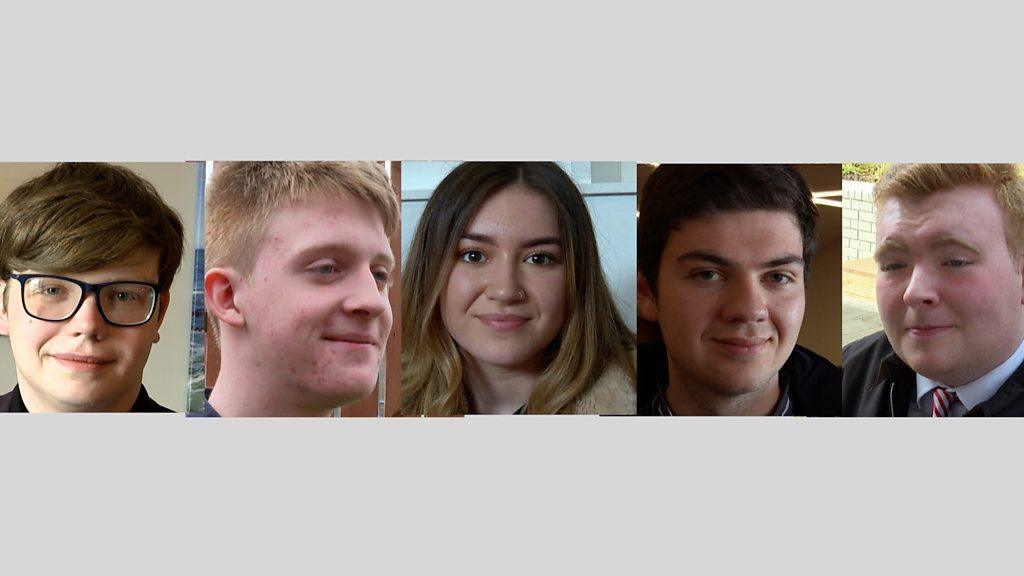NI council elections: 'New voters' behind Alliance success
- Published
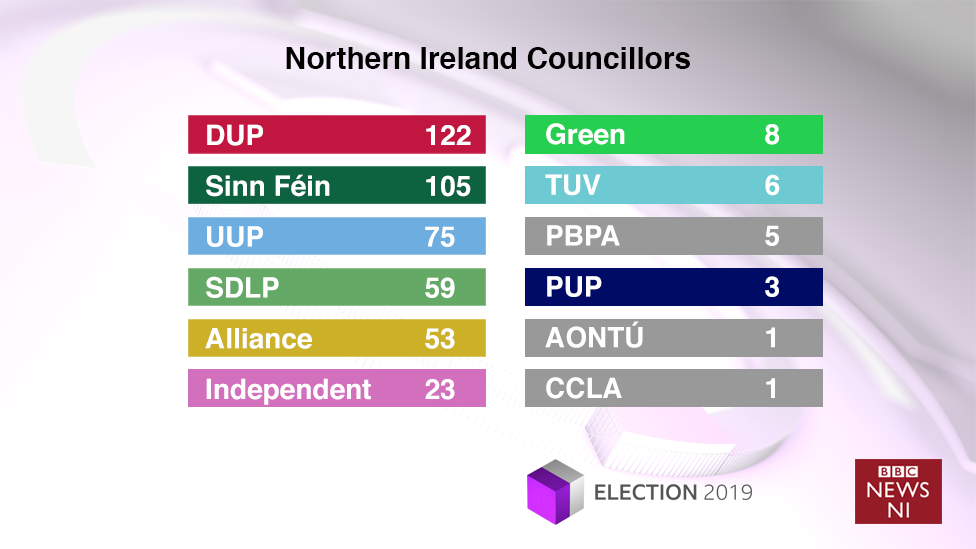
New voters have been credited for the Alliance Party's breakthrough in the Northern Ireland council elections.
Deputy leader Stephen Farry said he believed "the real growth across the centre ground" was largely due to the emergence of a new vote.
With all seats declared, Alliance saw a 65% rise in representation. Its number of seats rose from 32 to 53.
Speaking to BBC NI's Sunday Politics programme, Mr Farry said the party would not "sit back on our laurels".
"Simply being at 11% and still the fifth party in size is not good enough. We have to really transform the landscape of Northern Ireland politics," he said.
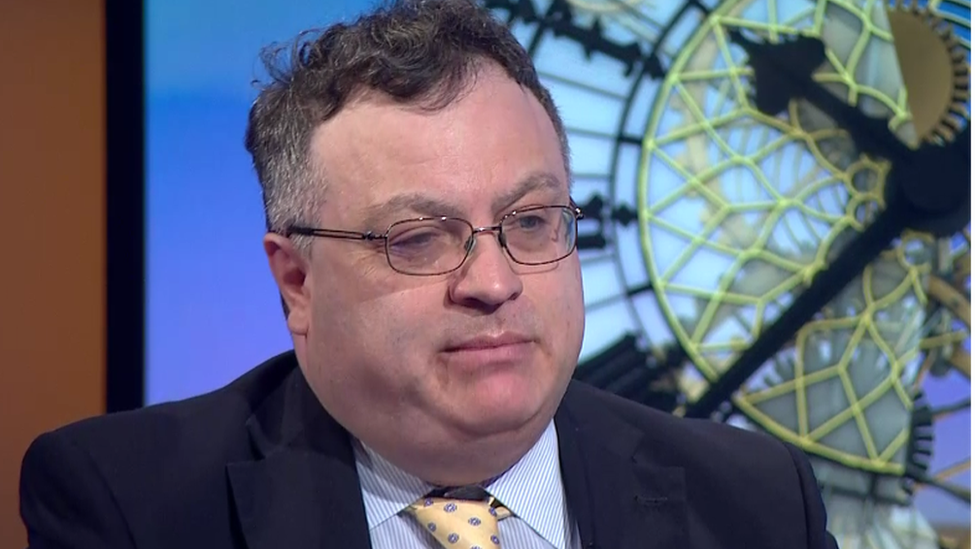
Alliance Party deputy leader Stephen Farry
Other smaller parties and independents also made significant gains in the council election.
The DUP and Sinn Féin are still the two biggest parties but the DUP lost eight seats. Sinn Féin kept all its seats but its first preferences fell slightly.
The Ulster Unionists lost 13 councillors, the SDLP seven and the Traditional Unionist Voice (TUV) fell from 13 seats in the 2014 council elections to just six seats.
The Green Party is still among the smaller parties, but it was a big winner this time round, doubling its representation from four seats to eight.
People Before Profit also had a good election, rising from a single councillor in 2014, to five seats with gains in Belfast, and Derry City and Strabane.
In terms of first preference votes, the DUP saw a marginal increase to 24.1%, but Sinn Féin's share was 23.2%, a slight drop on its 2014 results.
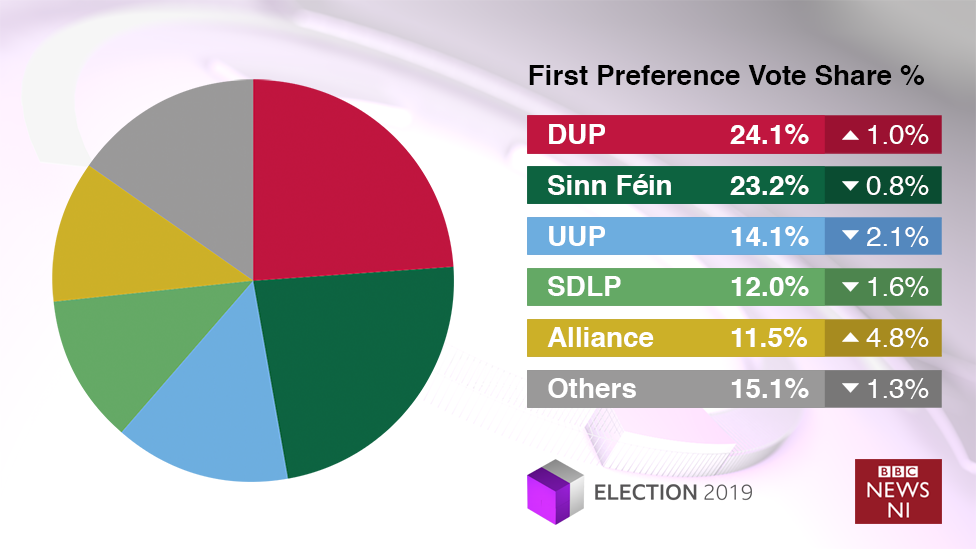
Alliance saw its share of the vote increase from 6.7% to 11.5%.
A sister party of the Liberal Democrats in Great Britain, Alliance is Northern Ireland's main centrist cross-community party, seeking to attract support from both Protestants and Catholics.
It won 10 seats in Belfast, an increase of two, where it will continue to hold the balance of power between unionists and nationalists.
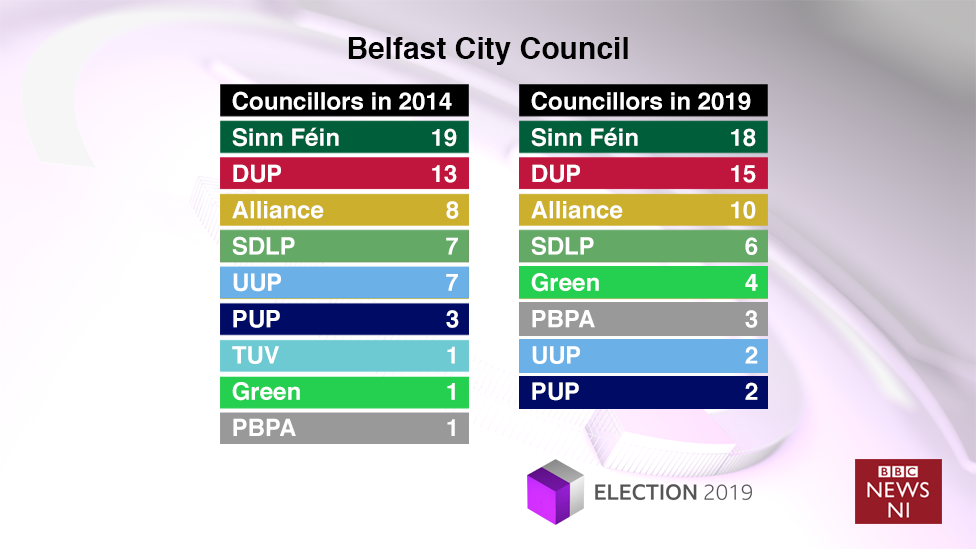
It also doubled its representation in Mid and East Antrim from three councillors to six, and for the first time in decades, it has representation in the north west with two seats on Derry City and Strabane District Council.
"Crucially, we've broken outside the Greater Belfast area for the first time in, I would say, 30 years," Alliance leader Naomi Long told the BBC.
She said it had been a breakthrough election for her party and other cross-community candidates, with many voters choosing to reject the "tribal politics" of unionism and nationalism.
Alliance leader Naomi Long explains why she thinks voters rewarded the party at the polls
Sinn Féin's results have been mixed. It won six out of seven seats in Blackmountain District Electoral Area (DEA), and for the first time, it has representation on Lisburn and Castlereagh City Council with two seats.
However, the party lost five sitting councillors from Derry City and Strabane Council.
The DUP also carved out some new territory, gaining two new seats in Belfast, and electing its first ever openly gay candidate, Alison Bennington, in Antrim and Newtownabbey.
But the party lost its leader on Belfast City Council, Lee Reynolds, after a low turnout in its east Belfast heartland.
The Green Party had some notable successes with four seats in Belfast, where Áine Groogan topped the poll in the Botanic DEA.
Allow X content?
This article contains content provided by X. We ask for your permission before anything is loaded, as they may be using cookies and other technologies. You may want to read X’s cookie policy, external and privacy policy, external before accepting. To view this content choose ‘accept and continue’.
People Before Profit won three seats in Belfast while its former Stormont MLA Eamon McCann returns to frontline politics with a seat on Derry City and Strabane.
Veteran socialist Eamon McCann is "looking forward" to his new role as a councillor
Matt Collins topped the poll in the Black Mountain DEA and takes a seat at Belfast City Hall alongside his brother Michael and newcomer Fiona Ferguson.
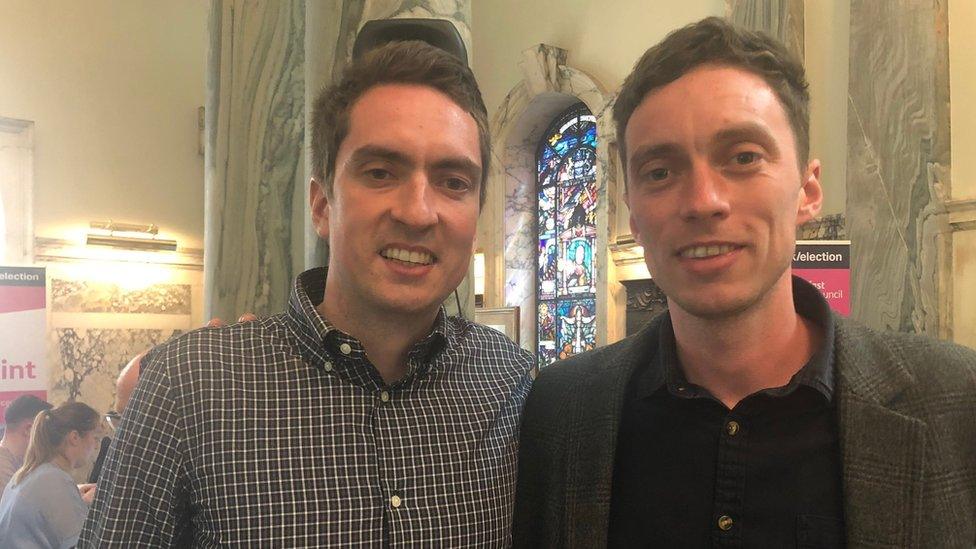
Brothers Matt and Michael Collins will sit together on Belfast City Council
The Ulster Unionist Party (UUP) lost a number of seats including its Belfast councillors Jeff Dudgeon, a well-known campaigner for LGBT rights, and veteran David Browne, who was first elected 26 years ago.
Independents have also taken support from larger parties.
In Newry, Mourne and Down, independent candidate Gavin Malone, a former council worker, topped the poll in the Newry District Electoral Area (DEA).
The first-time candidate, who quit his 20-year career to run for election, got 2,296 first preferences, beating his nearest Sinn Féin rival by more than 900 votes.
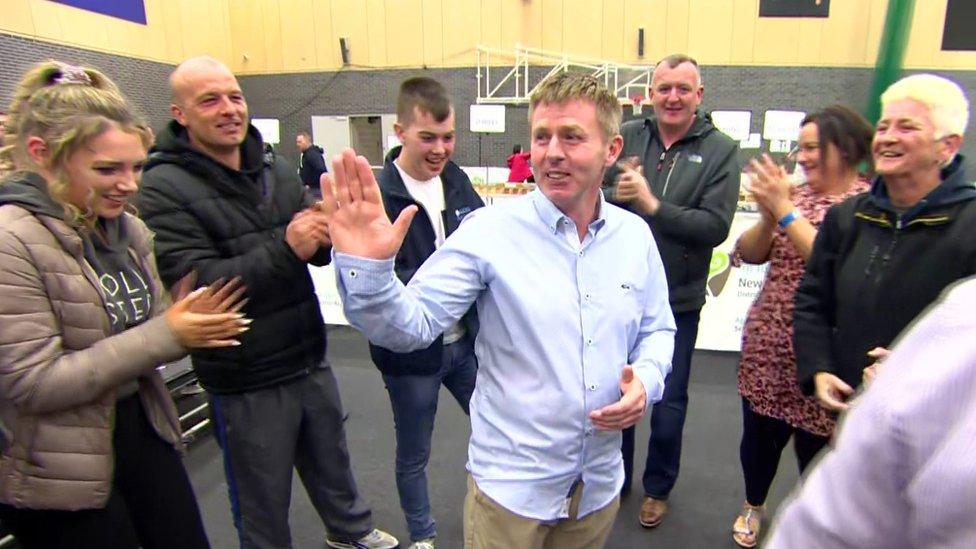
Independent Gavin Malone celebrates an impressive victory in Newry
Former Sinn Féin MP Barry McElduff, who resigned his Westminster seat over a Twitter controversy, was elected to Fermanagh and Omagh District Council.
Allow X content?
This article contains content provided by X. We ask for your permission before anything is loaded, as they may be using cookies and other technologies. You may want to read X’s cookie policy, external and privacy policy, external before accepting. To view this content choose ‘accept and continue’.
He quit as West Tyrone MP last year after he was accused of mocking victims of the Kingsmills massacre - 10 Protestant workmen were shot dead by the IRA.
Mr McElduff maintained that the video - published on the 42nd anniversary of the murders - was meant as a joke and the timing was coincidental.
Goldmine
In the same DEA, former SDLP turned independent Dr Josephine Deehan polled 728 first preference votes, more than both of her SDLP rivals put together.
The GP was elected in the eighth round.
Elsewhere in the Fermanagh and Omagh Council area, an anti-gold mining campaigner was the first person to be elected in the Mid-Tyrone DEA.
Allow X content?
This article contains content provided by X. We ask for your permission before anything is loaded, as they may be using cookies and other technologies. You may want to read X’s cookie policy, external and privacy policy, external before accepting. To view this content choose ‘accept and continue’.
Emmet McAleer, who stood as an independent, polled almost 900 first preferences and won a seat in the fifth round.
But not everyone can go it alone.
In Belfast, three independents who left the SDLP over a row about abortion policy, all lost their seats.
Pat Convery, Kate Mullan and Declan Boyle quit the party in 2017.
Counting will continue on Saturday night until all 462 seats are filled across 11 councils.
Allow X content?
This article contains content provided by X. We ask for your permission before anything is loaded, as they may be using cookies and other technologies. You may want to read X’s cookie policy, external and privacy policy, external before accepting. To view this content choose ‘accept and continue’.
In Belfast's Castle area, Alliance's Nuala McAlister topped the poll.
Sinn Féin's John Finucane was elected on the first count.
He is the son of murdered solicitor Pat Finucane who was shot dead in front of his wife and three children in 1989.
John Finucane says he wants to "change Belfast for the positive"
The DUP made some gains in Belfast with Nicola Verner taking a seat in Court, from former TUV candidate Jolene Bunting.
Ms Bunting, who had been involved in a number of controversies during her five-year tenure, ran as an independent this time but only polled 351 first preferences.
In Derry and Strabane District Council, independent Gary Donnelly topped the poll in the Moor electoral area - where journalist Lyra McKee was killed last month by dissident republicans.
He had refused to condemn violent dissident republicanism but in the wake of her murder he called on the New IRA to desist from further attacks.

Analysis: BBC NI political editor Mark Devenport:
It has been a similar theme to day one, which is that of Alliance victories, they have the most to be pleased about as the result of this election.
Clearly different voters vote for them for different reasons, but it may well reflect a disenchantment with the political paralysis up at Stormont.
The DUP will be pleased that they have held their own and actually increased their vote slightly at the expense of the Traditional Unionist Voice (TUV), which had a good election five years ago but has not been able to replicate that performance.
I think Sinn Féin will be disappointed, they missed a number of their targets and their vote has slid slightly.
One interesting development tonight is that it looks like Fermanagh and Omagh District Council might slip into no overall control, rather than being a nationalist majority council.
That is because there has been a wave of independents who won through there.
Those independents may actually be nationalist in their outlooks but it is a sign of changing times both there and in Belfast where some of the smaller parties have also come through.

Meanwhile, an independent candidate - who only stood for election after a Facebook post suggestion posted on 1 April garnered online support - has been elected to Antrim and Newtownabbey District council.
Michael Stewart, who runs the Love Ballyclare Facebook page, said: "I wasn't aware there would be this massive surge to independents, the Greens and Alliance. I didn't know I was part of anything."
He added: "I am one of those people who voted for me, who've no interest in politics - they care about holes in their roads, no paper in their schools and that they can't get an appointment with their health centre."
It has been a long election for candidates, counters and commentators.
In Armagh City, Banbridge and Craigavon District Council, Brian Pope of Alliance was elected following a marathon count that went on until 06:00 on Saturday morning.
'We don't exclude members of the gay community'
Unsurprisingly, the story that made headlines on Friday was the success of Alison Bennington, the DUP's first openly gay representative.
Belfast East MP Gavin Robinson said it was a "good news story", despite assembly member Jim Wells claiming members were "shocked by the decision" to let her run.
DUP leader Arlene Foster said she was delighted by Ms Bennington's electoral performance.
She said the party will consider comments made by Mr Wells post-election and said he should have raised any concerns "through the normal routes".
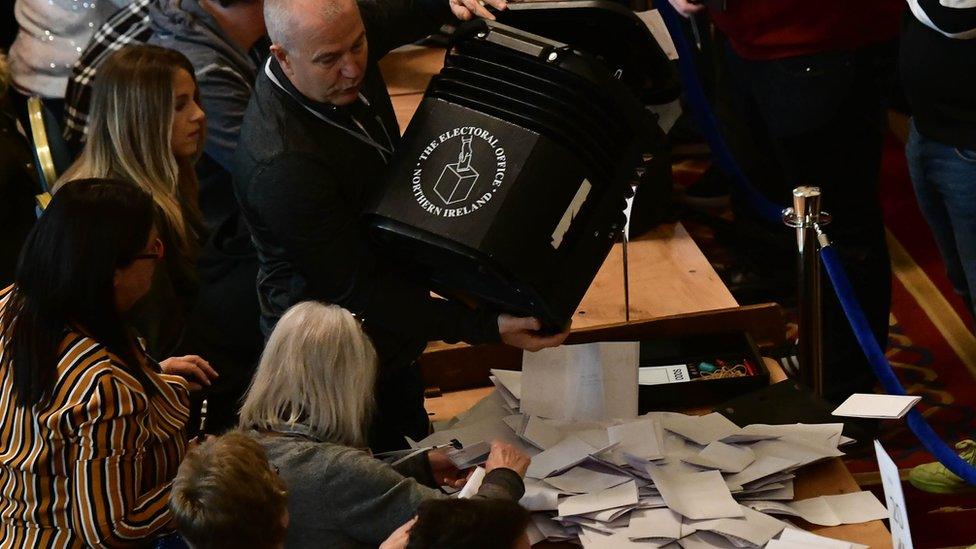
The first results started to come in after 11:00 on Friday
- Published2 May 2019
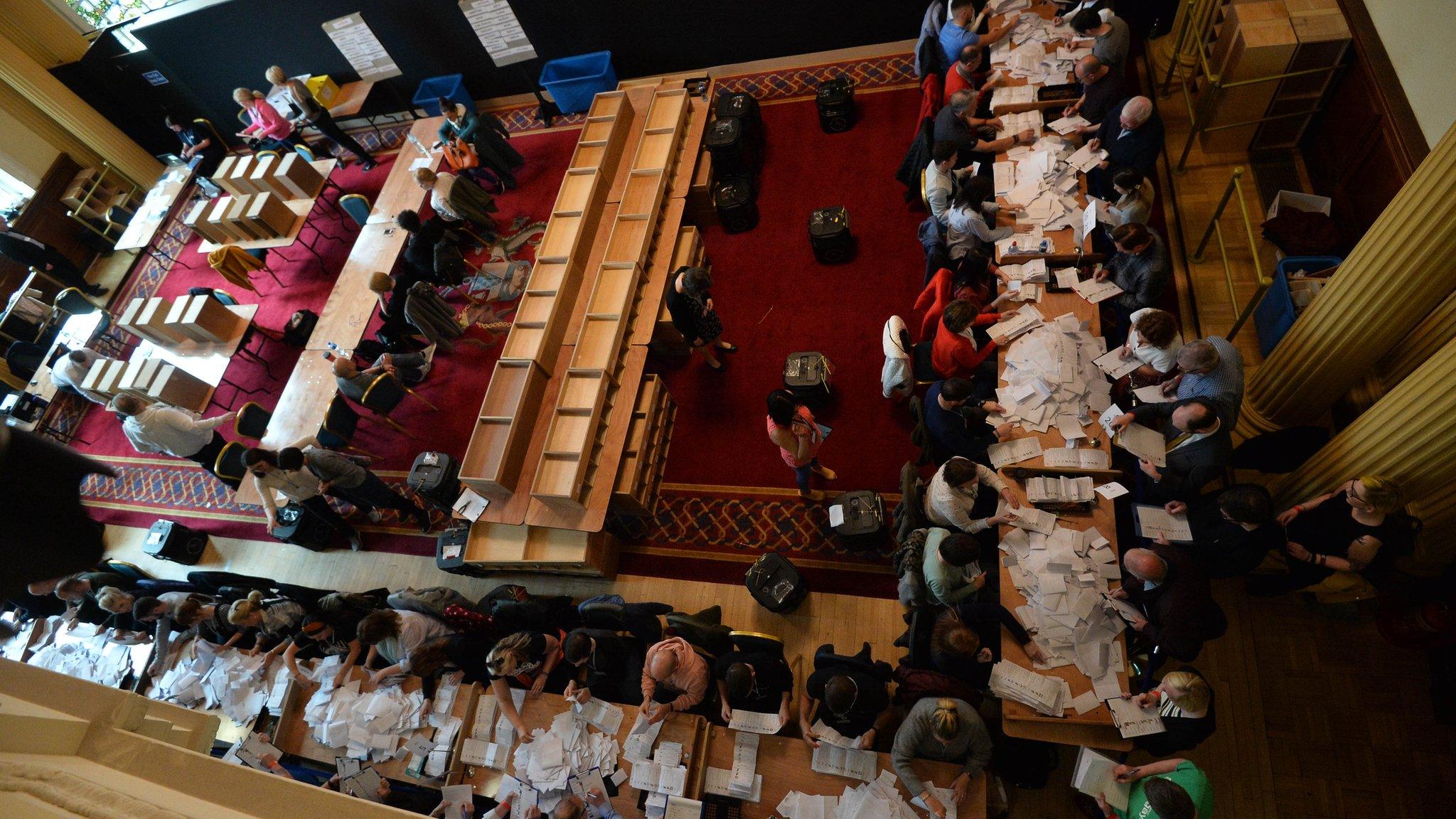
- Published4 May 2019
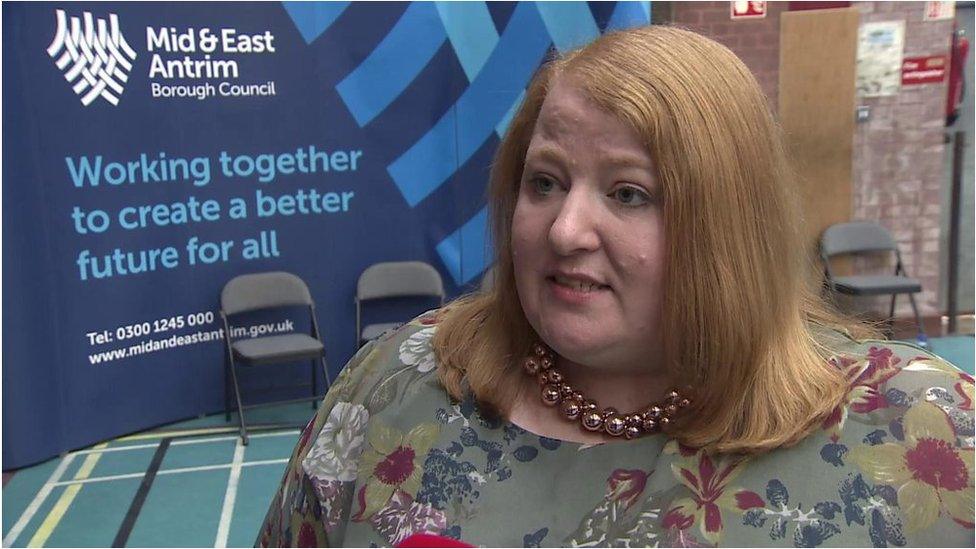
- Published4 May 2019
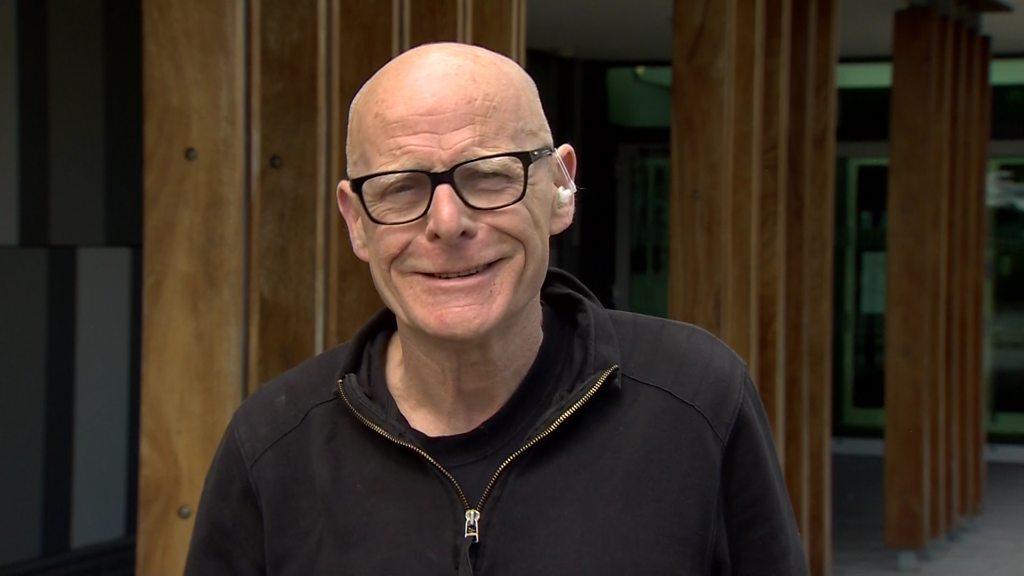
- Published4 May 2019
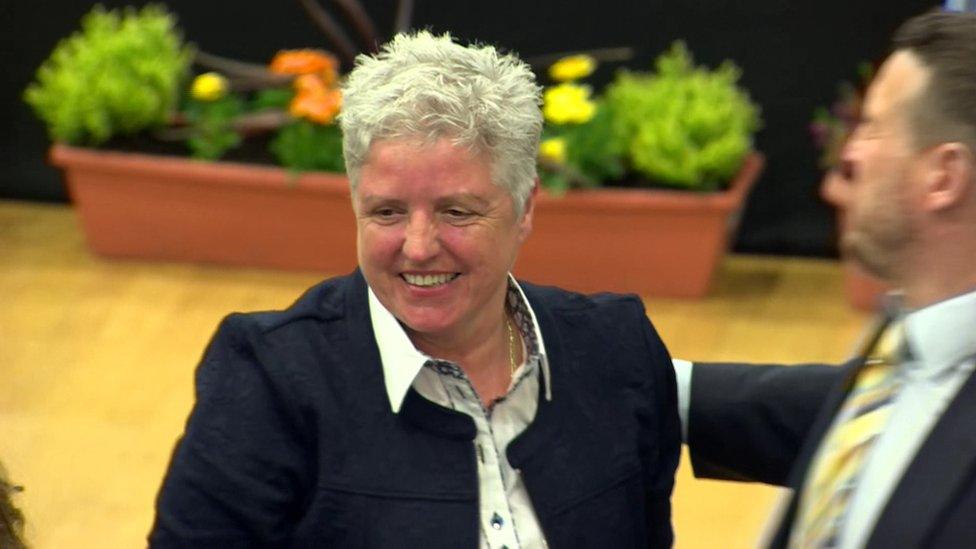
- Published3 May 2019
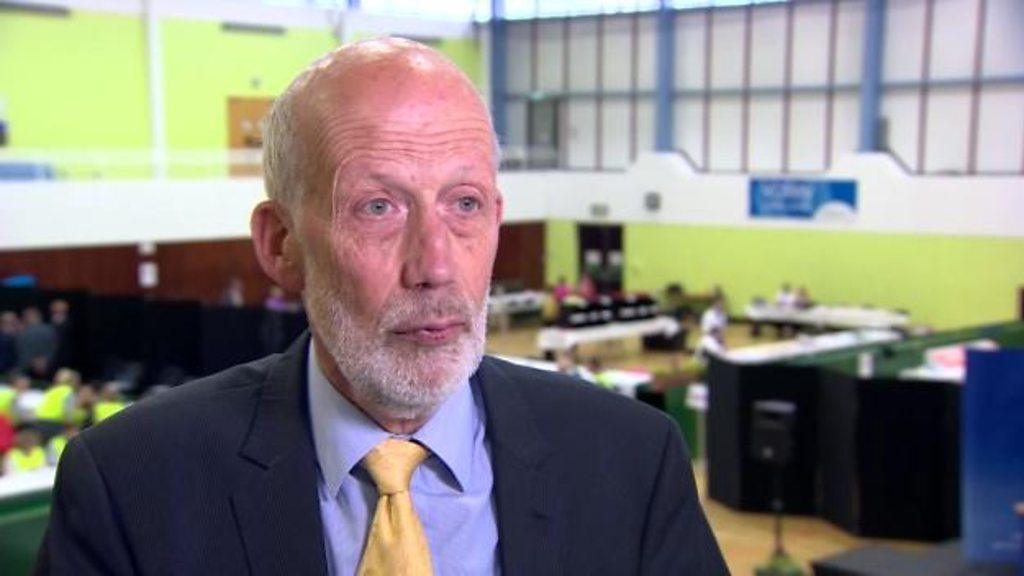
- Published30 April 2019
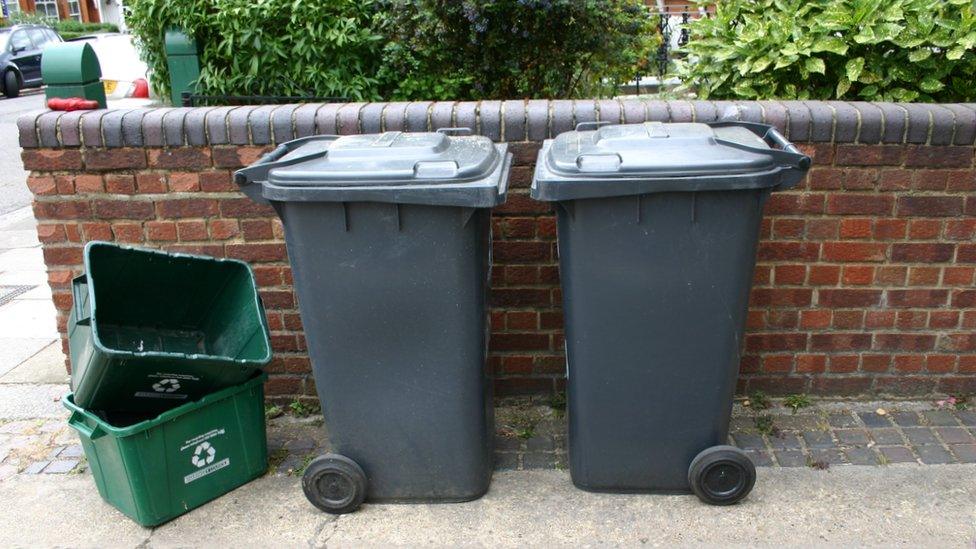
- Published3 May 2019
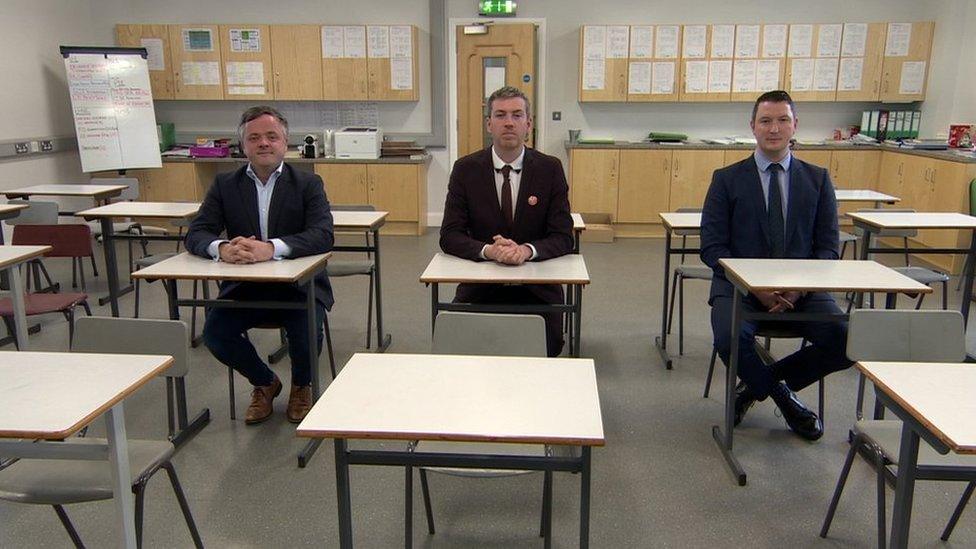
- Published1 May 2019
